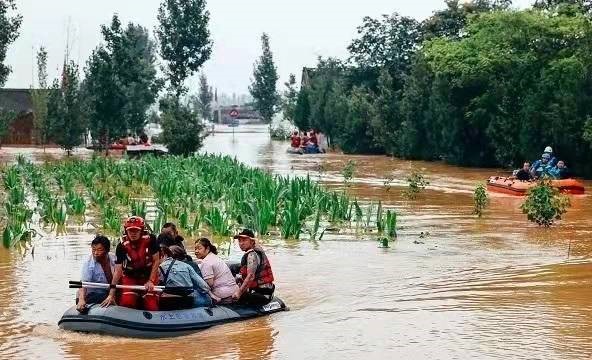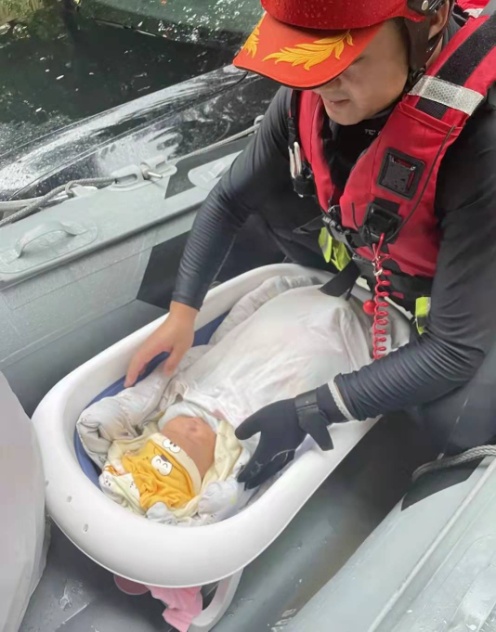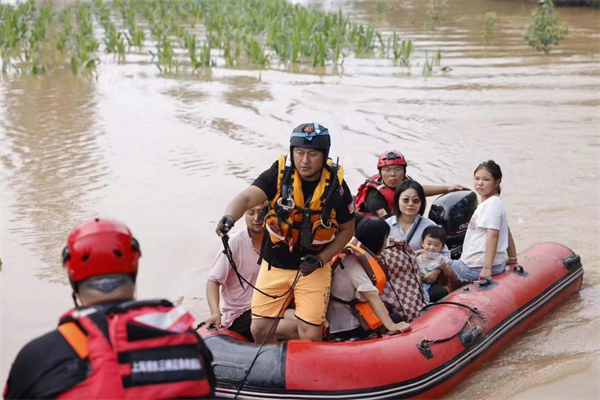(Editor’s note: There are only a few days left of 2021. In that time Eastday.com will tell the story of five people in Shanghai, who epitomise the city’s transformation and its future. In the third article, we sat down with Xu Jun, a civilian hero who leads a special rescue team.)
“We are heading to Xi’an as we just received a call from the Xi’an Anti-Epidemic Command Center. The task will take a long time. Maybe we will not return for the Spring Festival.” Late at night on December 26, three members of Pudong’s Sanqi Emergency Rescue Team packed up for Xi’an, which is now under siege from COVID-19. This will almost certainly be the last rescue task undertaken by the Sanqi team in 2021.
Founded by Xu Jun, a retired sergeant who used to serve the border defense force, Sanqi team has always been contributing their efforts and skills to anywhere in need of special rescue.

Back in July, 2021, Xu Jun and his Sanqi team went viral online among Shanghai people’s WeChat moments, because of their rescue efforts in the Henan flood. Since then, the civilian rescue team has become more familiar to the public.
“We set off for Zhengzhou on the evening of July 20. Later, we did not sleep for three days and nights, searching for people constantly. After a short break, we headed for Xinxiang and fought over seven consecutive days in the three hardest hit areas,” recalled Xu. Even though it happened half a year ago, he still has a fresh memory of the task. The team transferred more than 6,000 trapped people, including one unaccompanied mentally handicapped person, seven pregnant women, and two under-one-month-old babies.

The team seems to be always on the move. Now, they are heading for Xi’an for anti-epidemic disinfection.
Not born heroes but brave people
The team members on the forefront actually have their own jobs. Rescue is an aspiration and career that they are willing to devote themselves to after work, even though it means that they may have to give up their spare time.
“We are the only charity rescue team in Shanghai that consists of retired soldiers. Our members are from fire special service departments, armed police force, PLA special forces brigade, and the national rescue team,” said Xu with much pride.

Oftentimes, once there is an assembly call, members have little time to say goodbye to their family. When they were heading to help Henan flood victims, they left in a hurry so they could only leave a note to their family: “I’m off to Henan to the rescue. Take care of yourself, dear daughter.” “I will be home safe and sound.” “I will be home soon.”
However, the rescue tasks are not as smooth as ordinary people might think. There is always hidden danger.
Gao Hang, vice captain of the Sanqi team first dispatched to Henan, waded through chest-high floodwaters while carrying trapped victims.
Liao Hao, a member of the team, got wet through as he used his body as an umbrella for an under-one-month-old baby. Some other team members fell into the rapids during the rescue, while the rescue boat was scraped by glass shards. They are too busy to eat during the tasks, but never say anything about it. “The more professional, the more needed,” said Xu, adding that professionalism is the principle of Sanqi, and the root of healthy development for all civilian rescue teams.
Looking to the future of civilian rescue
The frequent occurrence of natural disasters and public emergencies is a test of the government's emergency management capabilities. It also calls for effective participation and coordination of diversified resources and forces.
As an integral part of the national governance system, social organizations are important tools to improve the capabilities and professionalism of social governance.
Sanqi team is such a social organization. Rooted in Shanghai, the team also contributes their efforts in helping other provinces whenever there is need.
Putting aside the honor of “civilian heroes”, civilian rescue teams face many various practical problems: lack of uniform standards, high costs of operation, and uneven professionalism, while rescue is an extremely complex and professional task.
Established in 2018, Sanqi is the only rescue team in Shanghai that is equipped with the capabilities to complete coordinated rescue between air and land. It is also the only one with special rescue abilities on land, at sea and in the air, and the only one which operates in earthquakes, waters, diving, and high-altitude situations.
Entering Sanqi’s warehouse, you will be greeted with various rescue equipment: a diving rescue suit that can withstand minus 30 degrees Celsius, a professional life jacket that can bear the weight of two adults, a safety helmet for different rescue scenarios, assault boats, oxygen cylinders, basic medical supplies, and emergency kits which are always on standby and filled with vacuum-packed biscuits and other rescue materials.
“A set of large-scale professional earthquake rescue equipment costs 1 million yuan. We also send team members out to get trained in diving rescue, and the training fee for each member is around 300,000 or 400,000 yuan,” said Xu. Nevertheless, he keeps investing in personnel and equipment to become ever-more professional.
Speaking of their plan for 2022, Xu said, “Very simple. Keep improving our professionalism.”
Q&As
Q: 2021 is about to end. How would you describe the year?
A: Actually, this year has been a relatively busy year for us, as there were a number of disasters, which is not what we want, personally speaking. Of course, the work has also brought honor to our team. We came from obscurity to the attention of the public.
Q: How do you look back on the past year?
A: 2021 is a critical year for our team, and it is also a very decisive year. We transformed from a group of people with kindness to a more professional group. This year has brought our team more honor and we feel a better team spirit.
Since we are here doing this, the first thing is to maintain our professionalism. Otherwise, we will not be able to undertake the tasks when we are needed. If we can't meet the professional demands, we will not be able to deal with situations properly at the earliest time, or stand in the forefront. So it is more important for us to integrate the feedback with our past rescue experiences.
Q: What is your outlook for next year?
A: In fact, it is very simple. Do our job well, and improve our professional capabilities under the leadership of the Emergency Management Bureau.
Story by Chen Lina, Wang Pengchong, Cai Huanghao
Translated by Wu Qiong
